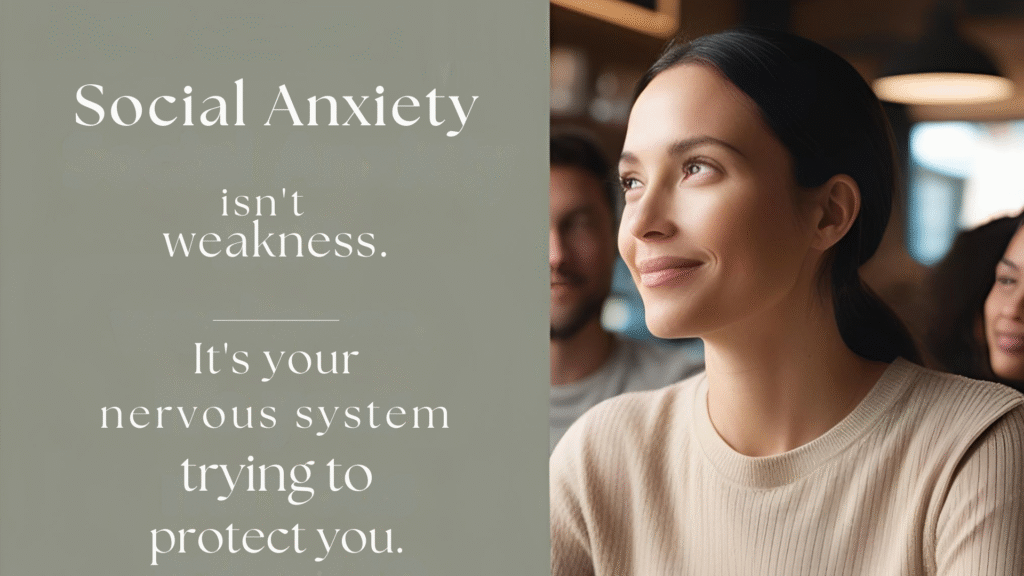
Table of Contents
- Understanding Social Anxiety
- 3 Gentle Strategies to Cope With Social Anxiety
- Mindful Breathing
- Simple Conversation Starters
- Celebrate Small Wins
- For Therapists: How to Support People With Social Anxiety
- Encouragement for the Journey
- Visual + Audio Prompts for Social Sharing
- Sources
Understanding Social Anxiety
Social anxiety doesn’t always look like fear; it often feels like overthinking, self-doubt, and exhaustion.
For many of us, it shows up in day-to-day situations: a group chat you hesitate to reply to, a meeting that leaves you drained, or a simple hello that feels monumental.
Roughly 15 million adults in the U.S. struggle with social anxiety disorder, according to the Anxiety & Depression Association of America. It tends to start in the teen years and can continue without support. But here’s the truth, social anxiety is manageable. And you don’t have to try to handle it on your own.
Whether you’re someone who experiences these feelings or a therapist guiding others through them, this post will walk you through gentle, practical ways to cope with social anxiety and offer a few therapist-backed tools for support.
3 Gentle Strategies to Cope With Social Anxiety
1. Use Mindful Breathing to Regulate Your Nervous System
When anxiety spikes, our breathing often becomes shallow and rapid. That’s our nervous system reacting to perceived danger—even if it’s just a group dinner.
Try this: The 4-7-8 Technique
- Inhale quietly through your nose for 4 seconds
- Hold your breath for 7 seconds
- Exhale slowly through your mouth for 8 seconds
Repeat this a few times. You might not feel immediate relief, but over time, this becomes a skill your body can learn to rely on. Breathing grounds us. It reminds the brain: you’re safe here.
🔁 YouTube Resource: Dr. Andrew Weil – 4-7-8 Breathing Technique
2. Keep a Few Easy Conversation Starters Handy
It’s not about becoming Mr. or Ms. Social Butterfly overnight. It’s about having a few go-tos to anchor you when the pressure builds.
Here are a few low-pressure conversation openers:
- “How’s your week been going?”
- “Have you tried the food here yet?”
- “I saw [topic] in the news—what did you think of that?”
You’re not trying to impress—you’re simply showing up.
Pro tip: Jot down a few safe openers in your phone’s notes app. Read through them before any social event. A little prep can go a long way.
3. Celebrate the Small Wins You’d Usually Ignore
Did you make eye contact with anyone today? Speak up in a class? Say yes to an invitation even if you left early?
That counts. That’s progress.
Write these wins down. Literally. Use your notes app, a journal, or Voice Memos. Small wins are the bricks that build up confidence, and they matter so much more than you think.
For Therapists: How to Support People With Social Anxiety
If you’re a therapist, you’re already equipped to help, but here are a few gentle tools to increase the way you can support:
Normalize the Experience
Use statistics and stories to show how common social anxiety is. Reinforce the truth: This is not a personal failure. It’s a human experience.
Try: “A lot of people struggle with this—it doesn’t mean you’re broken. It means you care deeply.”
Use Collaborative, Gradual Goal Setting
Avoid challenging social exposure goals (i.e., answering a question in a class or meeting right away, etc.). Instead, work together to create mini-goals:
- Attend a gathering for 10 minutes
- Initiate one casual conversation
- Stay present during one uncomfortable moment
When therapy becomes a shared process, it can feel less intimidating—and more empowering.
Model Self-Compassion Techniques
Whether it’s mindfulness, thought reframing, or simple affirmations, teach your people how to talk to themselves gently. Many folks with social anxiety are their own worst critics.
Say things like:
“What would it look like to talk to yourself the way you would a friend?”
“What tone would feel kind, not just right?”
You’re not just helping them reduce their anxiety. You’re guiding them toward learning to trust themselves more.
Encouragement for the Journey
If you’ve ever walked out of a social event feeling drained or like you “messed up,” know this: you’re not by yourself. You’re doing your best. And improvement doesn’t mean becoming someone else – it means feeling safe enough to be yourself.
If you’re reading this as someone in the middle of that journey, keep going.
If you’re a therapist supporting others through it, keep showing up.
We grow in small, meaningful steps—and each one is worth celebrating.
Sources
- Embrace Psychiatric Wellness Center. Effective Coping Skills for Social Anxiety Disorder.
- Hanson, R. Top Coping Skills for Social Anxiety.
- Malvern Behavioral Health. Social Anxiety in Young Adults: Root Causes, Coping Mechanisms.
- Anxiety & Depression Association of America. Understanding Social Anxiety Disorder.
Want more gentle strategies for building confidence and easing anxiety? For weekly tips, visual guides, and tools you can use, follow me on Instagram.
📌 Related Posts You Might Like:
- 6 Surprising Reasons Your Anxiety Isn’t Going Away (and How Treating Anxiety Holistically Can Help)
- Self-Care for Anxiety: Daily Habits That Can Actually Help
- Understanding Anxiety: You’re Not Alone

Leave a Reply